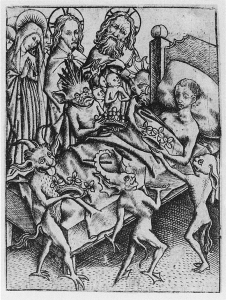Earlier this week I learned that a teenage girl recently – like last month – contracted Bubonic plague while on a hunting trip to the Heppner region of Eastern Oregon. Doctors suspect she was bitten by a flea that was carrying the disease. Thankfully, due to modern medicine, she is recovering in a Bend hospital and expected to make a full recovery from the disease that had once been viewed as God’s punishment on mankind for sins and from which very few recovered.
The Black Death, also known as the great plague, occurred during the mid-14th century in Europe. During a short period of time the great plague, which really involved three kinds of plague (bubonic being only one), swept northward through Europe wiping out whole villages and towns with a speed and deadliness that really has not been matched since. The towns and cities only partially infected still could lose 30-40% of their populations. Even the recent Ebola outbreak Africa did not claim the number of lives that even approaches the carnage of the Black Death. The Black Death led to a wide scale economic, social, and some religious upheaval as people began to wrestle with the new reality that death could be lurking just around the corner and strike without notice at all. And most importantly there was no cure, no remedy, nothing that could be done once you’d been infected.
matched since. The towns and cities only partially infected still could lose 30-40% of their populations. Even the recent Ebola outbreak Africa did not claim the number of lives that even approaches the carnage of the Black Death. The Black Death led to a wide scale economic, social, and some religious upheaval as people began to wrestle with the new reality that death could be lurking just around the corner and strike without notice at all. And most importantly there was no cure, no remedy, nothing that could be done once you’d been infected.
I think this last part is the one that would be the most difficult to deal with. It is one thing to experience a disease that is horrible but there is some remedy that, if obtained, will give you a chance of survival. It is quite another thing to realize there is no hope of survival if you contract the worst form of the plague. You had to passively await death and hope against hope that you would survive. That’s a scary and hopeless situation.
At this point, some of you are wondering why such a morbid post. After all, death and plague are not really the most exciting and positive things to read about on your church website. This is true, but we might not have the plague, but the last time I checked, the human mortality rate is 100%. Sooner or later, our mortality catches up with us and that can feel hopeless and gloomy. Yet, that is where our faith must shine. Our faith speaks directly to the doom and gloom and hopelessness of the plague of death because if we believe anything, we believe that Jesus Christ has overcome this disease. The good news we bear witness to is that we do in fact have a remedy – a cure – a fix to the plague of death and his name is Jesus the resurrected one. Death is still something we experience, but if we belong to Christ and his blood has cleansed us from sin, we are immune from death’s sting. When death does come for us it is no longer a moment of gloom and horror, but a moment of triumph, a moment when hell is cheated of another victim. “Thank you Jesus for your sacrifice on our behalf and showing us the way to the father through your resurrection from the dead. We believe and trust in you that as you were raised so also will you raise us up on the last day and take us to be with you for eternity.”
Take a minute or so today and thank God for providing the remedy for sin and death through his son Jesus Christ.
Here is a beautiful song that speaks to this remedy for the plague of sin. DTW

